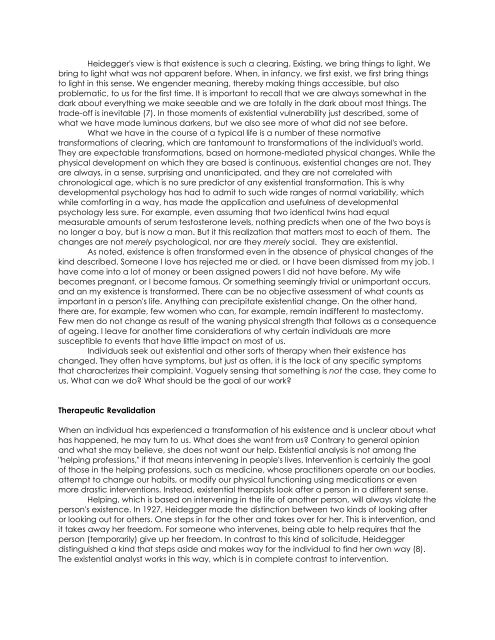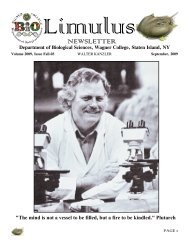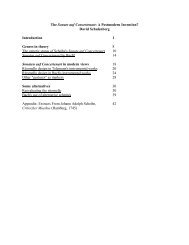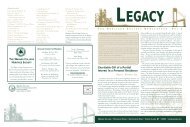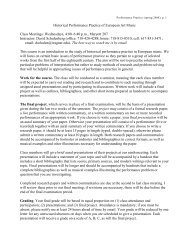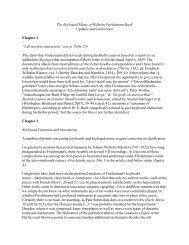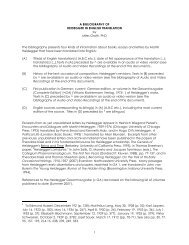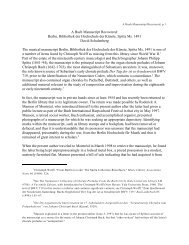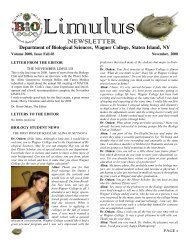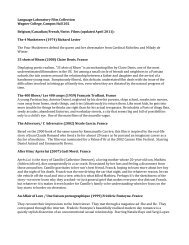SEVEN PAPERS ON EXISTENTIAL ANALYSIS ... - Wagner College
SEVEN PAPERS ON EXISTENTIAL ANALYSIS ... - Wagner College
SEVEN PAPERS ON EXISTENTIAL ANALYSIS ... - Wagner College
Create successful ePaper yourself
Turn your PDF publications into a flip-book with our unique Google optimized e-Paper software.
Heidegger's view is that existence is such a clearing. Existing, we bring things to light. We<br />
bring to light what was not apparent before. When, in infancy, we first exist, we first bring things<br />
to light in this sense. We engender meaning, thereby making things accessible, but also<br />
problematic, to us for the first time. It is important to recall that we are always somewhat in the<br />
dark about everything we make seeable and we are totally in the dark about most things. The<br />
trade-off is inevitable (7). In those moments of existential vulnerability just described, some of<br />
what we have made luminous darkens, but we also see more of what did not see before.<br />
What we have in the course of a typical life is a number of these normative<br />
transformations of clearing, which are tantamount to transformations of the individual's world.<br />
They are expectable transformations, based on hormone-mediated physical changes. While the<br />
physical development on which they are based is continuous, existential changes are not. They<br />
are always, in a sense, surprising and unanticipated, and they are not correlated with<br />
chronological age, which is no sure predictor of any existential transformation. This is why<br />
developmental psychology has had to admit to such wide ranges of normal variability, which<br />
while comforting in a way, has made the application and usefulness of developmental<br />
psychology less sure. For example, even assuming that two identical twins had equal<br />
measurable amounts of serum testosterone levels, nothing predicts when one of the two boys is<br />
no longer a boy, but is now a man. But it this realization that matters most to each of them. The<br />
changes are not merely psychological, nor are they merely social. They are existential.<br />
As noted, existence is often transformed even in the absence of physical changes of the<br />
kind described. Someone I love has rejected me or died, or I have been dismissed from my job. I<br />
have come into a lot of money or been assigned powers I did not have before. My wife<br />
becomes pregnant, or I become famous. Or something seemingly trivial or unimportant occurs,<br />
and an my existence is transformed. There can be no objective assessment of what counts as<br />
important in a person's life. Anything can precipitate existential change. On the other hand,<br />
there are, for example, few women who can, for example, remain indifferent to mastectomy.<br />
Few men do not change as result of the waning physical strength that follows as a consequence<br />
of ageing. I leave for another time considerations of why certain individuals are more<br />
susceptible to events that have little impact on most of us.<br />
Individuals seek out existential and other sorts of therapy when their existence has<br />
changed. They often have symptoms, but just as often, it is the lack of any specific symptoms<br />
that characterizes their complaint. Vaguely sensing that something is not the case, they come to<br />
us. What can we do? What should be the goal of our work?<br />
Therapeutic Revalidation<br />
When an individual has experienced a transformation of his existence and is unclear about what<br />
has happened, he may turn to us. What does she want from us? Contrary to general opinion<br />
and what she may believe, she does not want our help. Existential analysis is not among the<br />
"helping professions," if that means intervening in people's lives. Intervention is certainly the goal<br />
of those in the helping professions, such as medicine, whose practitioners operate on our bodies,<br />
attempt to change our habits, or modify our physical functioning using medications or even<br />
more drastic interventions. Instead, existential therapists look after a person in a different sense.<br />
Helping, which is based on intervening in the life of another person, will always violate the<br />
person's existence. In 1927, Heidegger made the distinction between two kinds of looking after<br />
or looking out for others. One steps in for the other and takes over for her. This is intervention, and<br />
it takes away her freedom. For someone who intervenes, being able to help requires that the<br />
person (temporarily) give up her freedom. In contrast to this kind of solicitude, Heidegger<br />
distinguished a kind that steps aside and makes way for the individual to find her own way (8).<br />
The existential analyst works in this way, which is in complete contrast to intervention.


